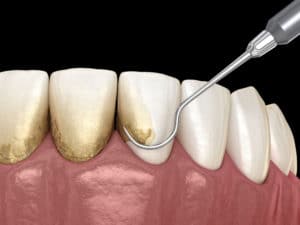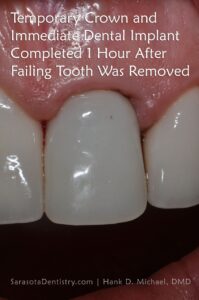Sore gums are a common dental issue. Gum pain can flare up when you’re brushing, flossing, eating, or drinking. Gums that are sore and swollen may also start bleeding when you brush or floss your teeth.
Gum pain is often mild and may go away on its own. Because it’s so common, many people ignore it until it becomes more severe. But because gum pain can indicate a more serious medical issue, take it seriously. If you’ve had gum pain for more than a week or if it hasn’t improved with home remedies, it may be time to make an appointment with your dentist.
Table of Contents
- What does it mean when your gums feel sore?
- Why are my gums sore?
- Causes of sore gums
- How do you treat sore gums?
- When should you seek professional treatment?
- What can happen if you don’t treat sore gums?
What does it mean when your gums feel sore?
There are many possible reasons for sore gums. Many causes are minor and very easy to treat. In some cases, they may simply be caused by oral hygiene habits such as poor teeth brushing or improperly flossing. Tobacco use also increases your risk. But sore gums also can be a symptom of health issues that may not even seem related to dental hygiene. In many cases, sore gums are caused by gum disease, which can be a serious health issue.
Why are my gums sore?

It’s crucial to accurately identify the cause of your sore gums so you can implement appropriate treatment before the problem worsens. Some causes of sore gums are easier to identify than others. It is important that you seek out a skilled dentist to properly diagnose the source of your gum pain. Improper diagnosis or neglecting to see a professional can lead to loss of teeth and increased risk of systemic disease such as cardiovascular disease.
Some very common causes of sore gums are:
- food, plaque, or tarter stuck between the teeth
- Fractured tooth
- Dry Mouth
- Ulcers caused by bacteria or a virus
- Trauma caused by a cuts, scrapes or burns (i.e. pizza burn)
- Tobacco use such as smoking or dipping
- Pregnancy causes changes in hormones which leads to sore gums
- Gum disease – many factors contribute to gum disease – treatment and diagnosis requires dental professionals such as a dentist or periodontist.
- Uncommon causes may include systemic disease, cancer or side effects of medication.
Even if you think you know the cause of your gum pain, it’s important to have it looked at by a professional to rule out anything more serious.
Causes of sore gums
Two common causes of sore gums are gingivitis and periodontitis, which are both forms of gum disease. Research by the Centers for Disease Control and Prevention shows that nearly half of American adults have some form of gum disease.
Both gingivitis and periodontitis should be treated as soon as possible to prevent further complications.
Gingivitis is an early and mild form of gum disease caused by poor oral hygiene. It occurs when plaque, or bacteria, is allowed to build up on the teeth. Other factors that contribute to gingivitis include stress, poor nutrition, diabetes, pregnancy, substance abuse, and the use of certain medications.
Early signs of gingivitis include redness, swelling, and bleeding. You may not feel pain right away. If you notice these symptoms along with sore gums, make an appointment as soon as possible for a professional cleaning. If left untreated, gingivitis can progress to a more serious condition known as periodontitis, a severe gum infection that can lead to other health complications, including loss of teeth.
Other less common causes of sore gums
In some cases, sore gums can be related to factors unrelated to oral hygiene, such as a vitamin K deficiency or a blood disorder. Hormonal changes that occur during pregnancy or menopause can sometimes cause sore gums and other dental issues.
Gum irritation can also be caused by poorly fitting dental devices such as dentures or mouthguards.
How do you treat sore gums?
Treatment for gingivitis includes improved oral hygiene and a professional cleaning. Brush your teeth at least twice daily, and floss every day. Visit your dentist for a cleaning at least once a year, ideally every six months, and more often for those susceptible to gum disease.
You can reduce your risk of gingivitis by using an ADA-approved mouth rinse, cutting down on foods that are high in sugar, quitting smoking, and using an electric toothbrush to help you clean your teeth better. Drink plenty of water to keep your mouth hydrated, as a lack of saliva can allow bacteria to grow and increase the risk of gum disease.

For periodontitis, a more extensive dental cleaning may be necessary. This may include a treatment known as scaling and root planing, also referred to as deep cleaning. When plaque accumulates under and around the gums, it can lead to gaps under the gums known as periodontal pockets. Scaling and root planing involves removing plaque and tartar deposits from these pockets and smoothing rough surfaces on the roots of the teeth. Smoother root surfaces will prevent bacteria from re-adhering below the gumline, which will help the gums heal and reattach themselves more securely.
Scaling and root planing may take more than one appointment to complete. Often, your dentist will recommend working on one quadrant, or one side, of your mouth at a time.
For sore gums that are not related to gum disease, directly addressing the cause of the gum pain usually resolves the problem. Quit smoking, eat a healthy diet, floss and/or proxy brush, and use a soft-bristle toothbrush. Take measures to manage stress, which is linked to hormonal changes that can contribute to inflammation throughout the body.
Pregnancy-related dental problems will usually go away after you give birth. However, it’s important to take extra care with your oral hygiene during pregnancy to minimize any symptoms. It’s safe to have a dental cleaning while pregnant, but make sure to let your dental professional know that you should not have x-rays taken.
If your sore gums are caused by a dental device such as a mouthguard, you may need a new device created. Over-the-counter mouthguards such as those used for sports may not always fit properly. Ask your dentist about a custom-made mouthguard that will provide dental protection without irritating your gums.
When should you seek professional treatment?
If you have sore gums that hurt or bleed for more than a week, or that don’t respond to the home remedies mentioned above, make an appointment with your dentist. Gums that bleed easily are often a sign of gingivitis.
What can happen if you don’t treat sore gums?

Without treatment, some causes of sore gums can lead to loss of teeth and other serious health conditions.
Untreated periodontitis can lead to the destruction of the jawbone that supports the teeth. Bacteria from infected gums can also enter the bloodstream and increase the risk of other serious health conditions. Research shows that people with periodontitis have 2-3 times the risk of a serious cardiovascular event such as a heart attack or stroke.
At Sarasota Dentistry, we offer general, cosmetic and implant dentistry as well as scaling and root planing for severe cases of gum disease. If you are experiencing sore gums, contact our office to schedule an appointment.
- Dental Implant Pros and Cons - August 26, 2023
- Receding Gums Stages - August 12, 2023
- When Is It Too Late for Gum Grafting? - July 8, 2023


